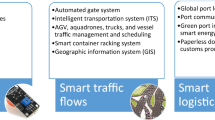Abstract
The 4.0 revolution in the shipping industry is growing fast and ports are requested to constantly innovate and evolve. Ports need to become not only smarter to implement more efficient, sustainable, and safer operations but also interconnected with each other. This paper presents the experience of the Easylog Project – Optimized logistics for ports and intermodal transport – funded under the Interreg IT-FR Maritime 2014–2020 program. Easylog aims to improve the mobility of rolling cargo between Italian and French regions by taking advantage of ICT technologies to increase the performance of intermodal transport chains and the overall quality of the services offered by ports. The project involves five ports in the upper Tyrrhenian area for which it proposes the shared adoption of integrated ICT devices for optimized and secure management of port operations between the operators involved in the cross-border (trans)port chain. The driving idea is to move from a non-integrated and fragmented management and control system of port events and flows to a common and connected ICT system. Easylog may represent a useful case study potentially replicable in many port contexts.
Access this chapter
Tax calculation will be finalised at checkout
Purchases are for personal use only
Similar content being viewed by others
Notes
- 1.
TPCS - http://tpcs.tpcs.eu/.
- 2.
The Easylog project website is available at http://interreg-maritime.eu/web/easylog.
References
Fancello, G., Schintu, A., Serra, P.: An experimental analysis of Mediterranean supply chains through the use of cost KPIs. Transp. Res. Procedia 30, 137–146 (2018)
Fancello, G., Serra, P., Schintu, A., Zoratti, A.: Performance evaluation of a tracking system for intermodal traffic: an experimentation in the Tyrrhenian area. Eur. Transp. 76(8) (2020)
Yang, Y., Zhong, M., Yao, H., Yu, F., Fu, X., Postolache, O.: Internet of Things for smart ports: technologies and challenges. IEEE Instrum. Meas. Mag. 21(1), 34–43 (2018)
Belfkih, A., Duvallet, C., Sadeg, B.: The Internet of Things for smart ports: application to the port of Le Havre. In: International Conference on Intelligent Platform for Smart Port - IPaSPort 2017 (2017)
Fernández, P., et al.: SmartPort - a platform for sensor data monitoring in a seaport based on FIWARE. Sensors 16(3), 417 (2016)
Baron, M.L., Mathieu, H.: PCS interoperability in Europe: a market for PCS operators? Int. J. Logistics Manag. 24(1), 117–129 (2013)
Heilig, L., Voß, S.: Information systems in seaports: a categorization and overview. Inf. Technol. Manag. 18(3), 179–201 (2016). https://doi.org/10.1007/s10799-016-0269-1
Carlan, V., Sys, C., Vanelslander, T.: How port community systems can contribute to port competitiveness: developing a cost–benefit framework. Res. Transp. Bus. Manage. 19, 51–64 (2016)
Zhao, W., Goodchild, A.V.: The impact of truck arrival information on container terminal rehandling. Transp. Res. Part E: Logistics Transp. Rev. 46(3), 327–343 (2010)
Heilig, L., Schwarze, S., Voß, S.: An analysis of digital transformation in the history and future of modern ports. In: Proceedings of the 50th Hawaii International Conference on System Sciences (HICSS). IEEE (2017)
Jović, M., Kavran, N., Aksentijević, S., Tijan, E.: The transition of Croatian seaports into smart ports. In: 42nd International Convention on Information and Communication Technology, Electronics and Microelectronics – MIPRO, pp. 1386–1390. IEEE (2019)
Riedl, J., Delenclos, F.X., Rasmussen, A.: To get smart, ports go digital. The Boston Consulting Group (2018). https://www.bcg.com/it-it/publications/2018/to-get-smart-ports-go-digital.aspx. Accessed Mar 2020
Van Baalen, P., Zuidwijk, R., Van Nunen, J.: Port inter-organizational information systems: capabilities to service global supply chains. Found. Trends Technol. Inf. Oper. Manag. 2(2–3), 81–241 (2009)
Fancello, G., Serra, P., Mancini, S.: A network design optimization problem for ro-ro freight transport in the Tyrrhenian area. Transp. Probl. 14(4), 63–75 (2019)
Italian register of road hauliers – Ministry of Transport and Infrastructure (2018). https://www.alboautotrasporto.it/web/portale-albo/. Accessed Nov 2019
Posti, A., Hakkinen, J., Tapaninen, U.: Promoting information exchange with a port community system–case Finland. Int. Supply Chain Manag. Collab. Pract. 4, 455–473 (2011)
Italian Official Gazette. https://www.gazzettaufficiale.it/eli/id/2018/05/21/18A03440/sg
Diaz, M.: Port community system – a key component of the future vision for cargo and port security. Gov. Supply Chain blue papers, Valencia (2003)
Tijan, E., Kos, S., Ogrizovic, D.: Disaster recovery and business continuity in port community systems. Multidisciplinary Sci. J. Maritime Res. – POMORSTVO 23(1), 243–260 (2009)
Acciaro, M., Serra, P.: Strategic determinants of terminal operating system choice: an empirical approach using multinomial analysis. Transp. Res. Procedia 3, 592–601 (2014)
Acknowledgements
This research is based upon the EASYLOG Project funded under the Interreg IT-FR Maritime Program 2014–2020Footnote 2. The authors would like to thank Andrea Zoratti for his valuable work within the EASYLOG project.
Author information
Authors and Affiliations
Corresponding author
Editor information
Editors and Affiliations
Rights and permissions
Copyright information
© 2020 Springer Nature Switzerland AG
About this paper
Cite this paper
Serra, P., Fancello, G. (2020). Use of ICT for More Efficient Port Operations: The Experience of the EASYLOG Project. In: Gervasi, O., et al. Computational Science and Its Applications – ICCSA 2020. ICCSA 2020. Lecture Notes in Computer Science(), vol 12255. Springer, Cham. https://doi.org/10.1007/978-3-030-58820-5_1
Download citation
DOI: https://doi.org/10.1007/978-3-030-58820-5_1
Published:
Publisher Name: Springer, Cham
Print ISBN: 978-3-030-58819-9
Online ISBN: 978-3-030-58820-5
eBook Packages: Computer ScienceComputer Science (R0)




